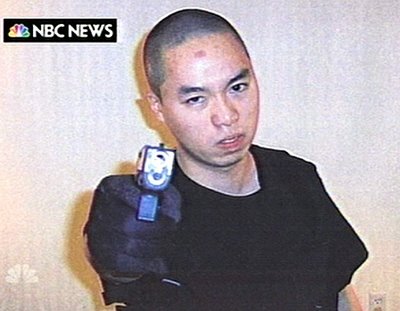The prime mentalist is back.
Labels: bloggocks, Damian McBride, fall of Gordon Brown, Gordon Brown, Guido, gutter sniping, mental ill-health, politics, smearing
Labels: bloggocks, Damian McBride, fall of Gordon Brown, Gordon Brown, Guido, gutter sniping, mental ill-health, politics, smearing
There have always been serial killers, murderers and terrorists, but never before have young men and teenagers in such a short space of time carried out such wanton acts of carnage against their own peers in the corridors of their schools. The easy availability of such lethal weaponry plays its part, but it doesn't explain why this epidemic has erupted in such a way, especially in the last decade. Teenage angst, alienation, mental illness and a thirst for revenge against both perceived and actual slights help us to understand why, but they don't tell the full story. These may be extroverted suicides, as [Lionel, author of We Need to Talk About Kevin] Shriver also argues, and Oliver James seems to concur, but there are thousands who kill themselves and who want to end it all without taking dozens of others with them. We have to examine whether the pressures being put on children everywhere to succeed whatever the costs, especially in a dog eat dog world which seems to grow crueller and nastier by the year, and where failing and even being "different" is worthy of ridicule is helping to contribute to the malaise which is afflicting youngsters, even if very few of them are going to slaughter their classmates as a result.
...
I don't have the solution or the answer, but if there is one thing that perhaps would help, it would be for more understanding both for those who suffer from mental ill-health and more attention to be given to those who do suffer from their own private demons while young. It just might prevent more re-runs of the current grieving than is necessary.
Labels: Germany, gun control, gun crime, mental ill-health, school shootings, Tim Kretschmer
Labels: bloggocks, fall of Gordon Brown, Gordon Brown, Guido, gutter sniping, mental ill-health, politics
 When Lionel Shriver, author of a novel on a child that becomes a spree killer, wrote on Tuesday that "[A]nonymity is the last thing most of his fellow campus shooters have sought" she didn't know just how quickly Cho Seung-hui was posthumously going to prove her right. Proving beyond doubt that Cho's subsequent rampage was planned in advance, his "manifesto" as NBC termed it, last night appeared on the network news channel in all its unedifying, blood-spattered ignominy.
When Lionel Shriver, author of a novel on a child that becomes a spree killer, wrote on Tuesday that "[A]nonymity is the last thing most of his fellow campus shooters have sought" she didn't know just how quickly Cho Seung-hui was posthumously going to prove her right. Proving beyond doubt that Cho's subsequent rampage was planned in advance, his "manifesto" as NBC termed it, last night appeared on the network news channel in all its unedifying, blood-spattered ignominy.It's good prose. The sentences flow well into one another, the paragraphs are coherent. The Unabomber even knows how to punctuate, and that's a very rare gift.
I didn't have to do this. I could have left. I could have fled. But no, I will no longer run. It's not for me. For my children, for my brothers and sisters that you fucked. I did it for them.
Labels: Cho Seung-hui, mental ill-health, school shootings, Virginia Tech massacre
 Following on from coverage last month of the conviction of Tom Palmer for murder, today's Daily Mail appears to be attempting to raise the stakes in the growing hysteria about the ill-effects of "skunk" cannabis.
Following on from coverage last month of the conviction of Tom Palmer for murder, today's Daily Mail appears to be attempting to raise the stakes in the growing hysteria about the ill-effects of "skunk" cannabis."The game allows the player to take on the role of a criminal in a big city. This persuaded him to stab someone. He was powerless to resist."
Labels: cannabis, Daily Mail-watch, Ezekiel Maxwell, Grand Theft Auto, knife crime, mental ill-health, moral panics, Telegraph-watch
[But] they did report that the 20-year-old has a family history of breakdowns, nervous disorders and even schizophrenia
He had access to weapons and knives through his interest in outdoor activities and sport - hobbies which appear to have begun innocently enough, but by the time of the killings he was proficient in several martial arts and kept stocks of practice equipment in his bedroom.
The court had heard Palmer was obsessed with violent horror films. His favourite was The Last Horror Movie, in which a serial killer videos himself slitting throats.The 1982 movie also features a gory beheading.
The case sparked warnings about the dangers of gruesome DVDs and using skunk. Labour MP Martin Salter said some horror films were “practically snuff movies”.
Labels: cannabis, knife crime, mental ill-health, moral panics, Tom Palmer